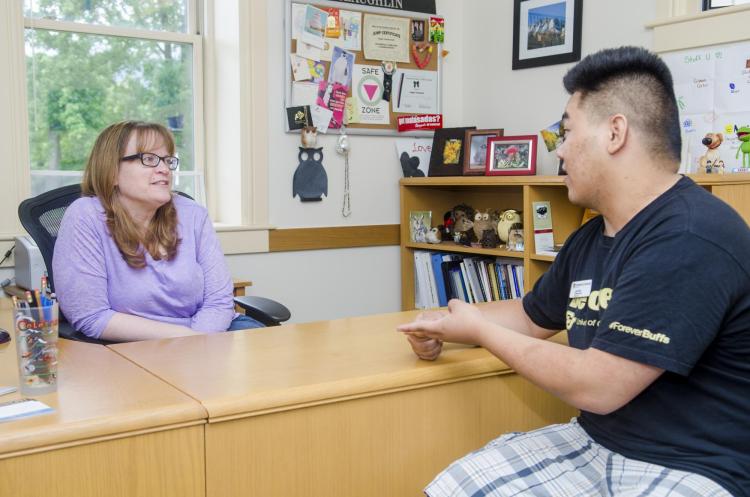Let’s get real: Declaring a major
Whether you are certain of what you want to do after college or you are exploring your interests, declaring a major can feel exciting and intimidating all at the same time. We’ve put together some things to think about to help you get started.
 Before you declare
Before you declare

Think about your interests, skills and how you learn best. Reflect on the courses you’ve most enjoyed and why you enjoyed them. What have been your favorite classes so far? Do you feel engaged and interested in the content you are learning? Identifying courses that keep you motivated and curious can give you clues into the subject areas you would want to pursue as a degree.
You can also think about your strengths or the things you are good at. For example, are you a strong verbal or written communicator? Do you excel at working with data? Do you learn best by “doing,” like in hands-on lab classes or in performing arts? If you have interests and skills across multiple areas, you can explore additional majors, minors and certificates too.
Your major may not equal your career
While the program you choose to study is important, it may not always determine your career. You will develop important skills in college that can be applied in different work environments. As you consider different majors, think more about the type of work you want to be doing and what skills you might need to do that work.
It can be helpful to set up some informational interviews and talk with people who are working in fields that interest you. This is an effective research tool that can help answer questions you might have about what it takes to work in certain industries. And you might be surprised by their college major or how they got their start in their career. Informational interviews are often informal, can take place virtually and serve as a great networking tool. Start by connecting with CU Boulder alumni on the Forever Buffs network.
If you are unsure about declaring a major or how your chosen major can be applied to a job in the real world, meet with a career development advisor at Career Services. They are an excellent resource for learning more about how the skills and knowledge gained through your major are valued and utilized in different careers.
Time to declare
When you feel ready to declare a major, there are a few ways to go about it:
- Meet with your advisor. Whether you need to choose a major or want to clarify information about the major you’ve chosen, speaking with your advisor can be very beneficial. You can discuss future courses to take and additional opportunities to grow in the major you want to pursue.
- Declare the major yourself. You can add, drop or change your major (if the major you want is in the college, school or program you are currently in) in Buff Portal Advising without meeting an advisor. Go to the “Student Success” box on the right side of your Dashboard page, click on the “Update Your Major/Minor” link, and you will be directed to the online declaration form.
- Attend drop-in hours. If you’re looking to add a second major, minor or a certificate in a specific field, attending drop-in advising hours can also help.
Changing your major
If you have declared a major but realize you don’t want to study that anymore, don’t worry—you can still change it. For example, if you declared an International Affairs major in the College of Arts & Sciences, but you want to declare an accounting major in the Leeds School of Business, you can do it through an Intra-University Transfer (IUT). Here is how:
- Explore IUT requirements and application deadlines for your CU Boulder college or school of choice.
- Talk to your academic advisor about your academic plans and discuss appropriate courses for completing an IUT, in addition to other course planning.
- Chat with an advisor in your college or school of choice to learn more. CU advisors across colleges host open hours for prospective IUT students. During the fall 2020 semester, these hours might be impacted by remote advising.
Remember, just because you declare something now doesn’t mean you are stuck with it forever. Reflect on the kind of work you’d like to do after graduation and the fields of study that can teach you the most skills to be successful in that work path.


